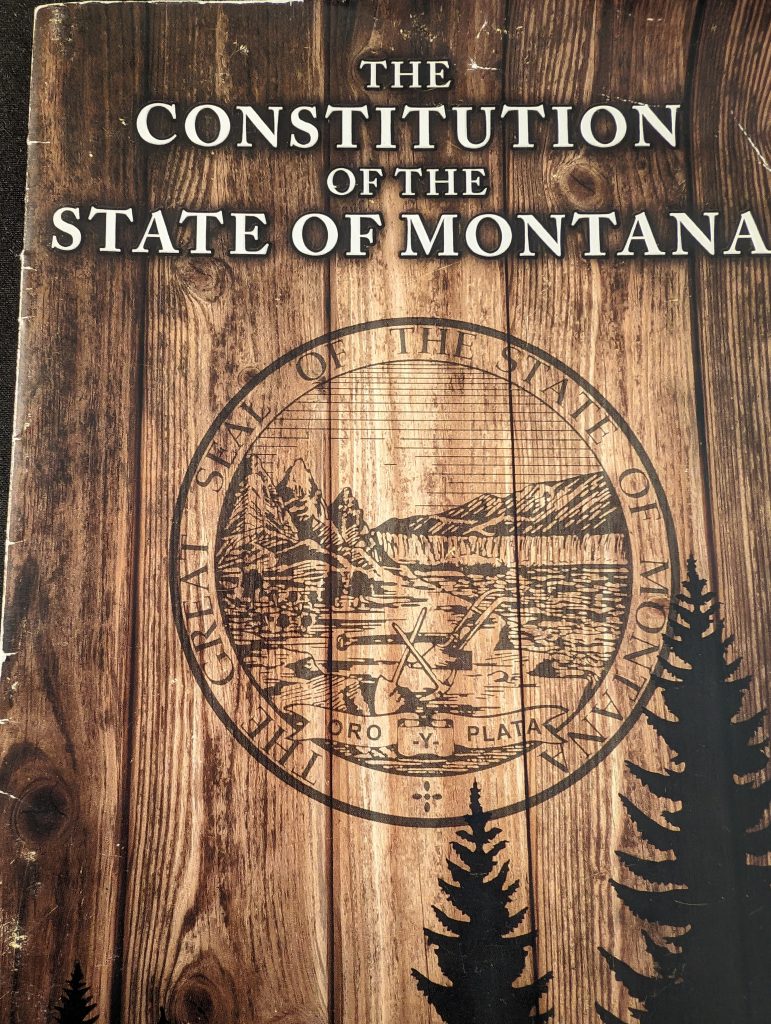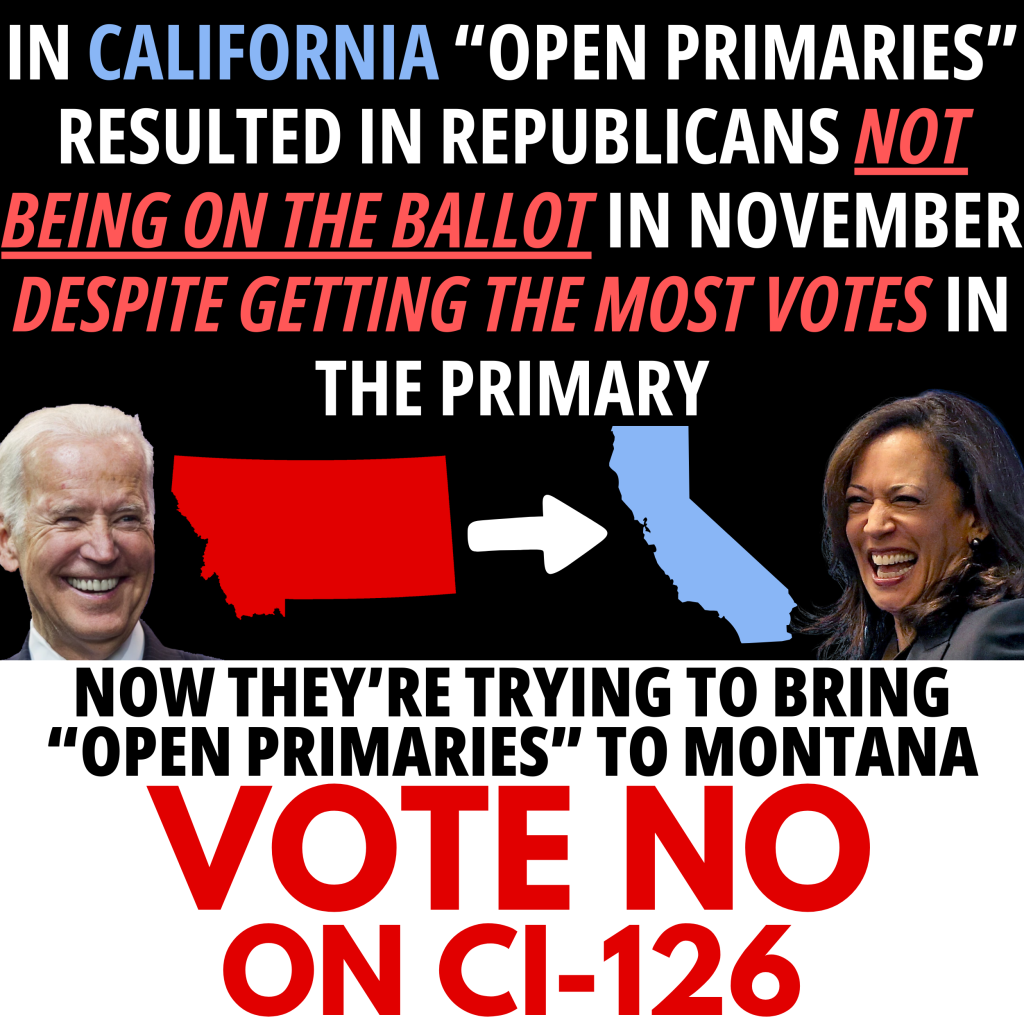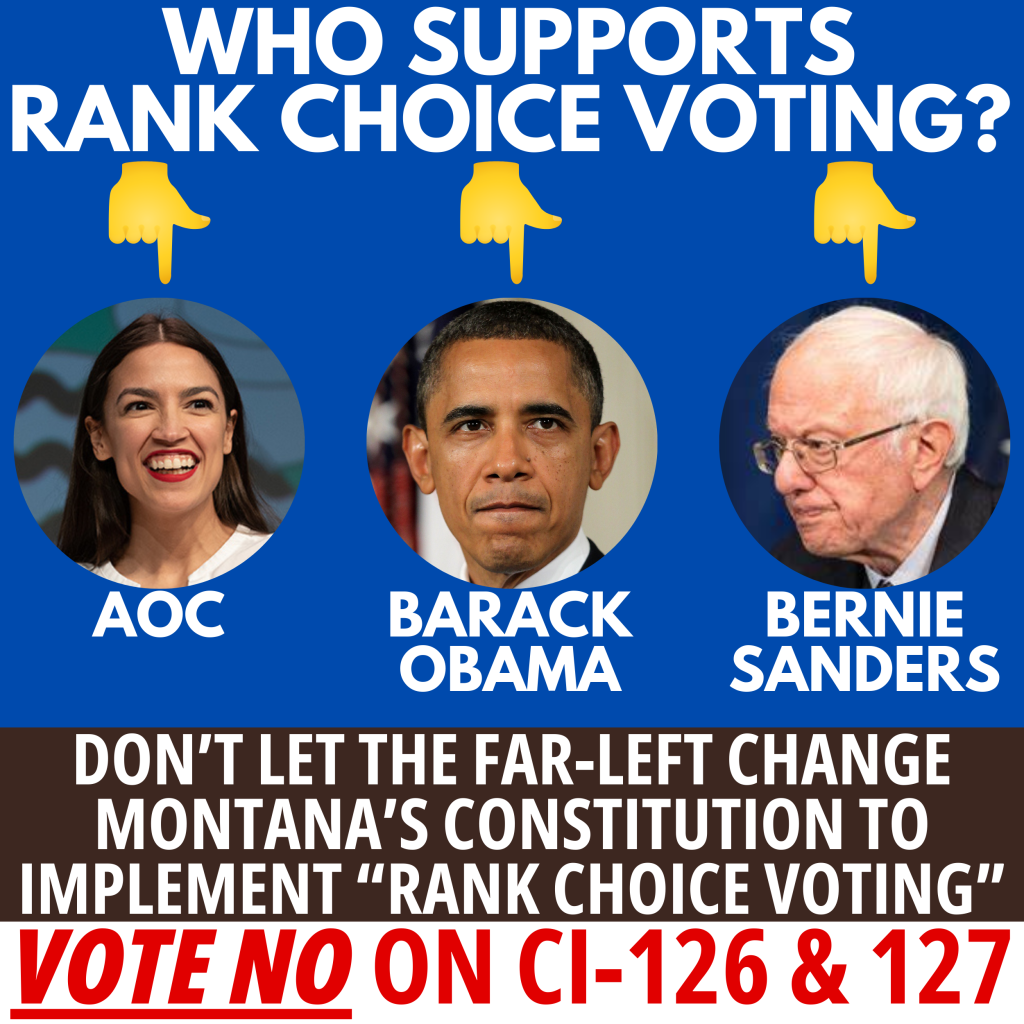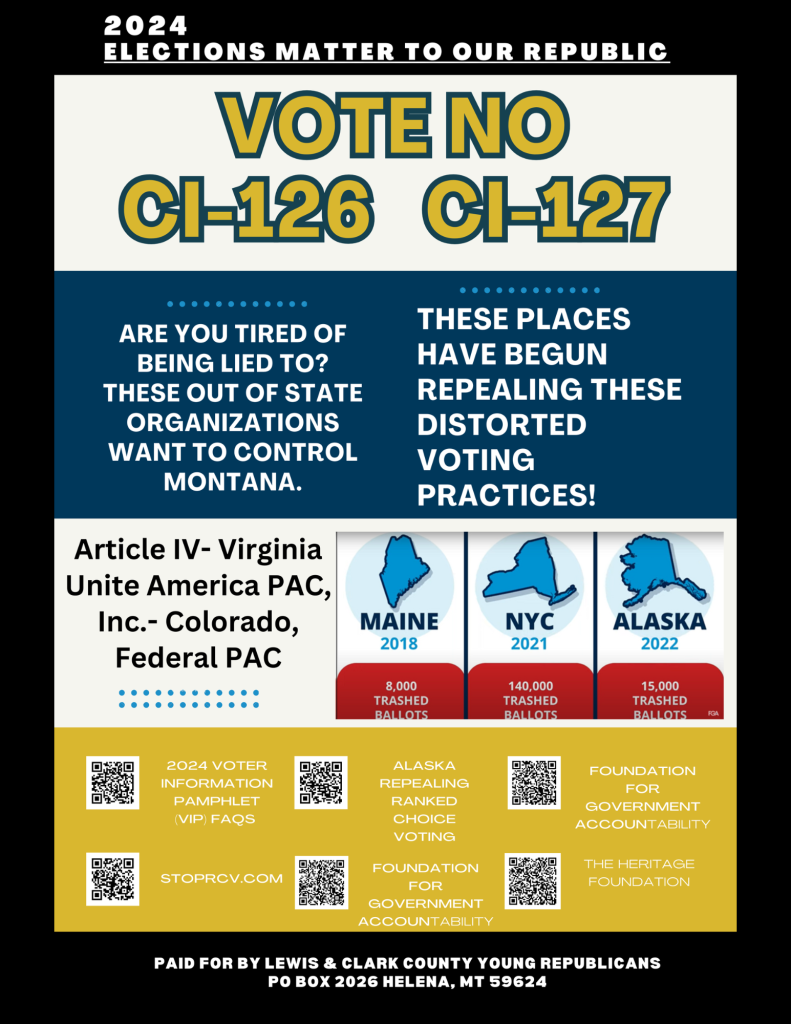Opinion by: Tom Millett - Republican Candidate for House District 2 (Marion-Libby)

Please Follow us on Gab, Telegram, Twitter
What is CI-126?
From the Secretary of State's website:
CI-126…amends the Montana Constitution to provide a top-four primary election. All candidates, regardless of political party, appear on one ballot. The four candidates receiving the most votes advance to the general election. A candidate may list a political party preference, but a candidate isn’t required to be nominated by a political party. A candidate’s political party preference isn’t an endorsement by the political party. The legislature may require candidates to gather signatures up to five percent of the votes received by the winning candidate in the last election to appear on the ballot. All voters may vote for one candidate for each covered office. The amendment applies to the elections for governor and lieutenant governor, secretary of state, auditor, attorney general, superintendent of public instruction, state representative, state senator, United States representative, and United States Senator.
Briefly:
• One ballot with all candidates listed.
• Political party affiliation is optional.
• The top four vote-getters in the primary election advance to the general election.
• Applies to governor and lieutenant governor, secretary of state, auditor, attorney general, superintendent of public instruction, state representative, state senator, US Representative, and US Senator
• The legislature can require prospective candidates to gather signatures up to 5% of the votes received by the winning candidate in the last election to appear on the ballot.
• Commonly called a Jungle Primary, Open Primary, or Blanket Primary.
On its face, this would seem like a promising idea: get more people involved in running for office and give We the People more of a selection of who to vote for. However, as will be seen, the devil is in the details.
Hundreds of Potential Candidates on the Ballot
Under CI-126, anyone can step up to the plate and place their name on the primary ballot for consideration, and if this happens, we could end up having hundreds of people to choose from. Imagine the size (and cost) of that ballot! Even if there were just 20 names on the ballot, it would still be a lot of candidates and a sizeable ballot. How will the average voter vet, sort out, and ultimately vote for just one candidate out of even 20…or 10? The answer is that the average voter won’t because they are too busy working and providing for their family or too confused by figuring out the best candidate that aligns with their values. Political parties, for all their perceived evils by the proponents of CI-126, actually help us to vet and sort out candidates so we can identify the best candidate that aligns with our values. Is it a perfect system? No, but it’s much better than having no system and leaving us to try and survive in the Jungle.
The “Up To 5%” Signature Requirement
The ultimate answer to the ‘hundred-candidate’ dilemma the voters may face is that they won’t have to deal with it because a mechanism embedded in CI-126 will discourage most people from even considering running for office. That mechanism is the “up to 5%” signature requirement. CI-126 allows the legislature to require all prospective candidates to gather the signatures of up to 5% of the qualified voters in the district they want to run in (house, senate, congressional, or statewide) to have their name appear on the primary ballot. To keep the ballot clean, streamlined, uncluttered, and only dedicated to “serious candidates,” you can bet your bottom dollar the legislature will institute some kind of signature-gathering requirement. To think otherwise would be a fool’s errand.
The table below provides a fairly accurate example of the number of qualified voters’ signatures a prospective candidate would have to gather if a “5% rule” is passed into law.

As the table above shows, all statewide offices would require thousands of signatures. Signatures in this quantity are nearly impossible to gather from just volunteers let alone a single candidate gathering them all. To gather thousands of signatures a prospective candidate would have to hire professional signature gatherers which would cost thousands of dollars. The only candidates who can afford paid signature gatherers are those with their own deep pockets or they’re backed by people, corporations, or political action committees (PAC’s) with deep pockets. This signature gathering requirement would undoubtedly keep most people out of the game who otherwise, under our current system, can get in the game (on the ballot) by simply filling out a candidacy form and paying a few bucks as long as they run under the banner of a qualified political party.
CI-126, rather than opening up the ballot for more people to run, will actually prevent many good people from running because of some sort of signature gathering rule that most assuredly will be implemented by the legislature. The question then needs to be asked is, Do the proponents of CI-126 understand that most people will be discouraged from running for office under their scheme or is that actually their intent?
‘Top Four’ Advance to the General Election
Only four (4) states currently allow Jungle Primaries: California, Washington State, Alaska, and Louisiana. In the Jungle Primary states of California, Washington, and Louisiana, only the Top Two vote-getters in the primary advance to the general election, while in Alaska, the Top Four advance. If CI-126 passes, Montana will go down the path of Alaska as a Top Four primary state. Note: Alaska is currently trying to abolish its Jungle Primary & Ranked Choice Voting System after only one election cycle, and Louisiana is seriously considering abolishing its Majority Vote System.
Proponents of CI-126 claim that having the Top Four vote-getters advance to the general election ensures that the voters will have a good mix of candidates to choose from in the general election. Really? What if the top four vote-getters are all from the same political party? Not much of a choice there. Or what if the Top Four vote getters conspire with each other, and between the primary and general election, 3 of the 4 candidates withdraw from the contest, leaving only one candidate on the general election ballot? Not much of a choice there, either. Or what if the Top Four candidates split the vote, and the winner is chosen by a whopping 26% of the electorate? Not much of a mandate for that candidate.
What is CI-127?
From the Secretary of State website:
CI-127…amends the Montana Constitution to provide that elections for certain offices must be decided by majority vote as determined as provided by law rather than by a plurality or the largest amount of the votes. If it cannot be determined who received a majority of votes because two or more candidates are tied, then the election winner will be determined as provided by law. This act applies to elections for governor and lieutenant governor, secretary of state, auditor, attorney general, superintendent of public instruction, state representative, state senator, United States representative, United States Senator, and other offices as provided by law.
Briefly:
• Majority vote wins elections rather than the current plurality (‘most votes’).
• Applies to governor and lieutenant governor, secretary of state, auditor, attorney general, superintendent of public instruction, state representative, state senator, US Representative, US Senator, and other offices as provided by law.
• Commonly referred to as “Majority Wins.”
The Louisiana Example
Louisiana has an election requirement similar to what CI-127 proposes in that it has a stipulation that the winner receives greater than 50% of the vote (a majority) to secure the victory. If no one wins a majority, then the top two (2) vote-getters head to a run-off election in early December to decide the winner. What’s the problem with a run-off in December? The problem is that ~20% of the time, they have run-off elections (in December, mind you) and subsequently delay their selection of US Congressional representation until then. Why is this bad? Congressional orientation and committee assignments (among other important happenings) occur in November/December before the congressional session starts in early January. By having no US Representative or US Senator determined until December, the Representative or Senator (and the people of that district/state) are disenfranchised on committee assignments, orientation, “setting up shop,” etc., as compared to all other Representatives and Senators. This is a very contentious issue for the people of Louisiana, and they are looking for ways to rid themselves of their majority vote system.
If CI-127 passes in Montana, then we will have the same problem Louisiana has regarding our US Representatives and US Senators. We would also have the same issues with our statewide office candidates if they had to endure a December run-off. For state legislators (representatives and senators), this would be an unmitigated disaster, place them at an even greater disadvantage than congressional representatives, and disenfranchise their constituents of proper and equal representation in the legislature. Why? In Montana, political parties caucus in November, the week following the election, to select their leadership for the next legislative session, which starts on the 1st Monday of January. Not being able to caucus with your party denies the people of that district a choice as to who will be the Speaker of the House, President of the Senate, Majority Leader, Minority Leader, Whips, etc. Also, legislators who must go through a December run-off are prohibited from submitting draft legislation to the Legislative Services Division until a winner is determined, thereby denying their constituents an equal footing with other legislators in developing legislation to bring forth during the session. In addition, legislator orientation would be delayed for those in a run-off situation until late December, and then they would have to hurry through the process. Housing in Helena, or lack of it, could also become an issue. I’m sure no one wants their state legislator sleeping in their car or a flop house during the session because they couldn’t find adequate accommodations.
Remember, all the above problems associated with a run-off election are predicated upon even having one. Since CI-127 leaves it up to the legislature to determine a method of ensuring a majority winner, we could end up with either a run-off election process or even a Ranked-Choice Voting (RCV) scheme, which brings on a whole other set of problems unto its own, as briefly explained below.
One last note on any run-off election is the additional cost. From paying election workers and printing more ballots to overtime pay for county employees, the costs could add up and strain the finances of small to medium-sized counties. Let’s also not forget the additional money the candidates will spend on TV and radio ads and all the additional flyers landing in our mailboxes through the Thanksgiving Holiday into early December. Only a deep-pocket candidate backed by special interests and PACs can afford to mount a competitive run-off election.
Ranked-Choice Voting (RCV)
Ranked-choice voting (RCV) is a radical, alternative voting system being pushed almost exclusively by the progressive Left to elect candidates they support. By changing how people vote, they can manipulate who wins elections. RCV is an alternative to America’s traditional “one person, one vote” system, which leads to thousands of trashed ballots, widespread errors, delayed election results, and diminished voter confidence.
Here are a few highlights of the RCV system:
• Makes voting harder and more complex.
• Makes elections more expensive.
• Slower election results and re-counts.
• Turns elections into a game of odds.
• Undermines voter confidence.
• Heavily funded by leftist dark money groups.
Even though Montana has passed legislation prohibiting RCV schemes (HB 598 – 2023), it’s very plausible that if the voters pass CI-127, it becomes a part of the Montana Constitution, an activist district court judge or a politicized Supreme Court (or both) would declare HB 598 unconstitutional, thereby paving the way for RCV scheme implementation.
Since RCV is a huge issue to unpack and would take up too much space to fully explain in this article, more detailed information on the RCV scheme can be found HERE.
“…and other offices as provided by law.”
Not only does CI-127 affect the above constitutional offices, but it can also affect any other office created by the legislature. Public Service Commissioner, County Commissioner, Clerk and Recorder, Sheriff, City Councilor, School Board Trustee, and even a Special District Trustee may be subject to a run-off election or, worse, an RCV scheme. These seven words have the ability to dramatically and fundamentally change the way we elect many people to office in the state of Montana, not just our constitutional offices.
Questions Nobody Is Asking
• What if CI-126 passes but CI-127 doesn’t?
We could have hundreds of candidates on the primary ballot and up to four (4) candidates going to the general election, with the winner selected by a plurality (most votes). In reality, we could have a governor leading the state of Montana who receives a little more than 25% of the vote. What kind of “mandate” would the governor have then?
• What if CI-127 passes but CI-126 doesn’t?
We would still have the current open primary system, but all the problems created by a run-off or Ranked-Choice Voting system would exist if there were independent or third-party candidates on the ballot that deny one candidate a clear majority win.
A Most Disturbing Threat
In the online discussion and debate about CI-126 and CI-127, one of the organizers of these initiatives, Doug Campbell of Montanans for Election Reform, has threatened to sue the people of Montana if the voters do not ratify their initiatives this November. He says a lawsuit will be filed if the initiatives do not pass.
In a Facebook post back in August in the Facebook group Montanans for Limited Government (MFLG), Mr. Campbell posted the following (in part):
• “If we don’t implement this Citizens’ Initiative as worded, then the state will be sued (and lose) on its (sic) currently un-Constitutional method of running primaries because it excludes nearly ½ of Montana voters or forces them to associate with one despicable political party or another. When the state loses that suit, the legislature will be the ones to write the language to apply the fix, likely with less favorable language to all voters.”
• “I am one of myriad future plaintiffs in that suit, should CI-126 not pass.”
• “I have won every single suit I have brought against the State of Montana, and I will win this one too.”
To which MFLG responded:
• “Not only do Montanans for Election Reform have plans for the November ballot, but they are also seemingly preparing to go to court. Lawfare is the tactic of the Left, so that may be the biggest tell yet of who these people truly are.”
Link to the Facebook post HERE.
Regarding suing Montana for having “unconstitutional” primaries, isn’t it interesting that Mr. Campbell recently determined they are unconstitutional? Montana’s primaries have been run the same way since at least the early 1970s when the 1972 constitution was ratified, if not before. Now, 52 years later, they are unconstitutional? I doubt a court will see it that way, but then again, an activist and politicized court just may.
Final Thoughts
Rather than changing the constitution, one solution to getting more candidates on the primary ballot who represent non-qualified political parties or are independent candidates is to change the 5% signature gathering law. Currently, if a prospective candidate wants to appear on the ballot, they must first gather the signatures of 5% of the qualified voters of a district or statewide, as the case may be. If that signature-gathering threshold is lowered to 1 or 2%, more non-qualified political parties and independent candidates would appear on the ballot. The question must then be asked: Why didn’t the CI proponents pursue this path?
Another solution to having more third-party or independent candidates on the ballot (and hence more choices) is to simply buckle down, do the work, and convince enough people to support your political party or candidacy. The mere fact that there are not more political parties active in Montana is because there isn’t enough interest in the general population to spur enough action to get them on the ballot.
With the proponents of CI-126 and CI-127 modeling these amendments eerily similar to the Alaska RCV scheme, with at least $4,000,000+ in funding for their cause coming from out-of-state interests, and most of that funding supplied from known supporters of RCV schemes in other states, one has to wonder if this is a coincidence or by design.
Link to Montanans for Election Reform Action Fund financial reports HERE.
It is the opinion of this writer that there are no coincidences and that the proponents of CI-126 and CI-127 desire Montana to eventually adopt an RCV scheme to turn us (wittingly or unwittingly) into a ‘purple’ state like Colorado or another liberal, failed state like California or Washington. They also know that their moderate-liberal views are not fully embraced in Montana. Instead of working within the current system to convince the people to vote for their ideas, they would rather destroy it and fundamentally change it to benefit their cause and themselves. This is something that the people of Montana cannot afford and should not allow.
Bottom Line
NO on CI-126 and CI-127.
Let’s keep Montana, Montana!



